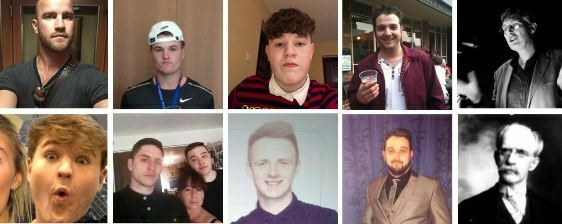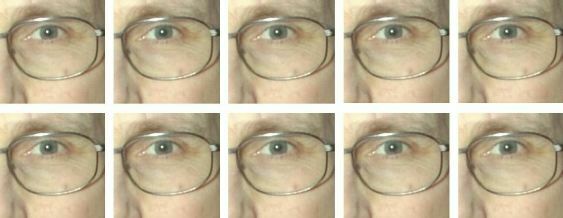
For many years my name was unusual; I thought, perhaps, unique. There were few people called Luke when I was growing up (things started to change following the release of Star Wars in 1977). The surname McKernan was a rarity outside of parts of Northern Ireland. The combination of Luke McKernan, the bringing together of two rarities, felt like a comforting one-off. My name, like my fingerprints, was mine alone.
The internet has disabused me of such vanity. There are a number of Luke McKernans out there – not a huge number, but a number all the same. Quick web browsing shows tells me that there is the Luke McKernan who is an American lacrosse player, the Luke McKernan who was a stores accountant in the Royal Navy and now is a hairdresser, the Luke McKernan who is a personal trainer in Reading, and a Luke McKernan who ten years ago was a minor league cricket player in Australia. Going back in time, it may be that the first Luke McKernan was a Victorian sewing machine agent, while in the USA there was a Luke McKernan of Bradford County, Pennsylvania (1860-1923), the Luke McKernan who was marshal of Clare, Iowa in the 1880s, and a Luke McKernan of Lafayette County, Wisconsin (1857-1913).
In the web world we are in competition. I grabbed the lukemckernan.com domain name and @lukemckernan on Twitter back in 2007, so those following after must resort to lukemckernan1, luke_mckernan and other such admissions of having come second in the race. But I am not the Luke McKernan you will find on Facebook, LinkedIn, Instagram, or other such badges of online identity. Having found others who got there first, I have no wish to follow. Sheer pride prevents me from ever wanting to be known as lukemckernan3.
There will be some with more common names who comes across their namesakes more frequently, and may have had to deal with the challenge of meeting one’s namesake face to face. I have not met any other Luke McKernan, but I can see their faces online. I find the experience disturbing. There is someone who does not look like me, sound like me (in all probability), think like me nor share any of my background or interests (again, in all probability). Yet there they are, somehow pretending to be me, just as they must be annoyed to find me pretending to be them. I might have gone a lifetime without ever been aware of their existence, but the Internet has brought us together. I am confronted by the disaggregation of a vital part of my identity.
There is a part of myself that has been diluted. I have witnessed the discomfort people feel when their name has been misspelt in a publication. Even the change of a single letter turns those words into someone that is not you, robbing you of the acknowledgment. How much greater then is the anguish when that which makes you what you are is shared by someone else – and someone who has done something entirely different with the inheritance.
We become our names; we are our names. We hear them mentioned above the hubbub of a crowd; we spot them amid the blur of a scanned text; we wince when they are mispronounced, natural precursor to being misunderstood. Our minds are continually attuned to looking out for confirmatory mentions of ourselves, just as we type in our names into search engines to find out what our virtual footprint looks like – only to find others sharing that which we must value as being ours alone.
We all know the effects that the Internet has had on the projection of identity. We present a version of ourselves online, which can be a form of disguise, or wish-fulfilment, but in all respects a doppelgänger who is a reflection of ourselves, or of a part of ourselves. The studies of the phenomenon (and there are many of them) focus on the ways in which we create online selves, particularly how we may hide (or unintentionally reveal) ourselves through assumed names, avatars and the like, seeking liberation or acceptance through degrees of invisibility. Such strategies are about protecting and defining an identity. So every Edgar becomes a Poor Tom.
But encountering someone online with the same name doesn’t seem to have been an aspect of such studies. How does someone feel when they want to establish an online identity for themselves under their own name, and find that many others have got there before them? What does it feel like to be relegated to JohnSmith23? What loss of self is there? The Internet is the ultimate leveller, telling us not only that all are the same because all share the same space, but that none of us is unique. It has nullified uniqueness. We can create online identities with fancy names to play the game of being someone else, but we still know our real name, who we really are. But we share it with someone else.
The power of one’s true name forms a rich literary and mythical theme. In Rumpelstiltskin, the miller’s daughter escapes from Rumpelstiltskin’s clutches when she finds out his true name. In Ursula Le Guin’s Earthsea novels, knowledge of a human’s (or a dragon’s) name gives you power over that person (or dragon). There is an atavistic fear of namelessness coupled with the fear of losing power because your name has become known. It is the stuff of folklore, and it is the stuff of online lives.
The added twist that the Internet has brought is faces. One could look down a telephone directory in times past and see others with the same name, sighing at what fashion or unimaginative parents had forced you to share. But nothing was revealed of character. The Internet tells me that not only can anyone be a Luke McKernan, but that a Luke McKernan can look like anyone. There is a certain amount of fraternal pride, as I see others sharing the same blessing, but ultimately I am diminished because I am just one permutation among many. I have lost power. The price of global interconnection is disenchantment.
But I do have the domain name.
